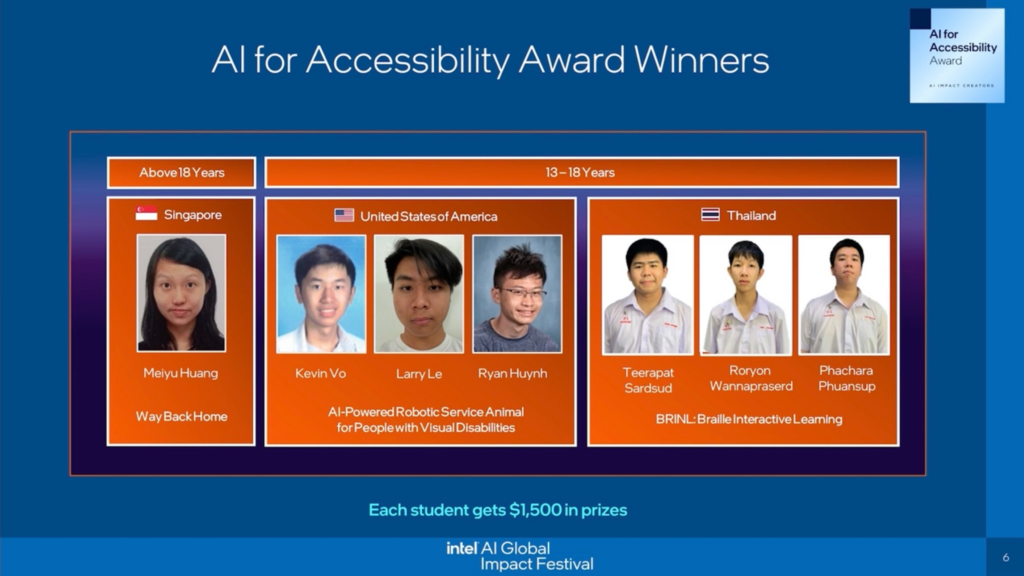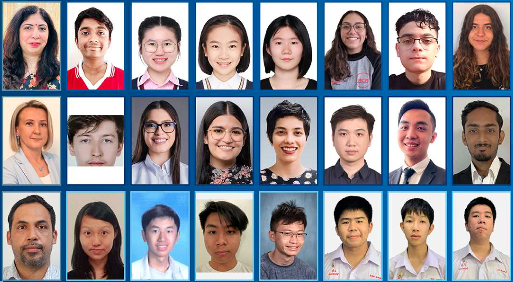
A trio of trailblazing students from the Huntington Beach Union High School District has earned two prestigious awards at Intel’s third annual AI Global Impact Festival.
Kevin Vo, Larry Le and Ryan Huynh from Westminster High School created and submitted an artificial intelligence-powered robotic service animal, designed for people with visual disabilities. In addition to clinching top honors for the United States, the entry took home the AI for Accessibility Award, along with a total of $2,500 in prize money.
Their winning project has its origins in the local Careers in AI program, which launched in 2022 as a joint venture between CEO Leadership Alliance Orange County, the Orange County Department of Education, Coastline ROP and Intel.
“Together, we were the first in OC to offer a high school class on Careers in AI with a direct connection to OC companies with career pathways in AI,” said Amy Kaufman, senior vice president of experiential learning and talent development for the CEO Leadership Alliance.
Kevin began working on the AI-powered robot concept with classmates while enrolled in Careers in AI in the spring of 2023. After the course ended, he recruited Larry and Ryan from his high school robotics team.
The end result was a robotic service dog that uses AI to help visually impaired users navigate different environments. The tech is intended to serve as an alternative to those who can’t afford a service dog.
Inclusion and accessibility
Hosted by Intel, the AI Global Impact Festival annually serves as a platform for young innovators, developers and educators worldwide to explore the potential of artificial intelligence to solve real-world challenges.
This year’s event took place virtually from Sept. 13 to Sept. 20 and employed the theme “Enriching Lives with AI Innovation,” which underscored the importance of AI in promoting inclusion and accessibility while making a responsible impact.

In fact, the category for projects focused on accessibility was new this year. Accessibility was also a key pillar of the online event, which included closed captioning, screen readers for those with visual disabilities, and translation to more than 120 languages.
“I am constantly amazed by the innovative young technologists who understand the potential of AI to be a force for good,” Intel CEO Pat Gelsinger said. “I am excited to celebrate this year’s innovative winners. The success of the technology of tomorrow relies on them, as they embody the Intel purpose to improve the life of every person on the planet.”
Winners by category
Tech-savvy participants vied for more than $500,000 in cash prizes, certificates, Intel laptops and mentorship opportunities at the festival. Here’s a rundown of the winners, courtesy of Intel:
13- to 17-year-olds:
- Eye tracking for communicating for patients with ALS (Brazil), Laura Jeronimo, Pedro Costa, Raissa Daloia: A low-cost communication system that identifies eye movements to select characters displayed on a screen, enabling patients with low motor capacity to communicate.
- AI-powered platform to empower women in STEM (India), Yash Yadav: An AI-powered learning platform that aims to empower female students to overcome the gender gap in STEM and develop a passion for these fields.
- Melody of Fingers (China), Shiyu Chu, Tianyi Liu, Jingyan Li: An app for sign language learners that captures users’ motion, tests their degree of mastery and offers real-time feedback.
18-year-olds and up:
- StraightenUp-Posture Assistant (Poland), Maciej Jalocha: A browser extension that helps users maintain a healthy posture while being in front of a computer by gently blurring the viewport when it detects the user has slouched.
- Utilizing AI to Help Native Bees (Costa Rica), Nicolle Daniela Gamboa Mena, Melanie Espinoza Hernández, Mariana Acuna Cordero: A set of algorithms and hardware that relies on computer vision techniques to easily detect unknown species or those that are at risk from an altered ecosystem.
- Rescue AI-Smart City Disaster Digital Twin (Malaysia), Joo Kiat, Cajun Ka Joon Tai, Rohit Thomas: A virtual replica in which operators can gain a comprehensive overview of a city’s disaster management system, from data collection to response, to save countless lives, minimize societal losses and reduce plastic waste.
AI for Accessibility Award:
- AI-Powered Robotic Service Animal (U.S.), Kevin Vo, Larry Le, Ryan Huynh: A robotic service dog that uses AI to help visually impaired users navigate through different environments, providing an alternative to those who can’t afford a service dog.
- Way Back Home (Singapore), Meiyu Huang: A solution that incorporates innovative technologies, such as augmented reality, indoor positioning systems and voice-activated assistants to empower individuals with dementia to navigate their surroundings more confidently and independently.
- BRINL – Braille Interactive Learning (Thailand), Teerapat Sardsud, Roryon Wannapraserd, Phachara Phuansup: A solution that utilizes AI to improve Braille learning for visually impaired individuals, promoting Braille literacy and empowering users with the ability to access information.
Responsible use of AI
Other innovations were also showcased, including an iFishSafe project submitted by Lauren and Alexis Low from Northwood High School in the Irvine Unified School District.
With the goal of expanding AI skills and digital readiness globally, Intel says it’s committed to reaching 30 million people in 30,000 institutions across 30 countries. But while AI can be a tool for positive change, festival organizers acknowledged it also poses new ethical challenges.
The 2023 AI Global Impact Festival featured a self-paced lesson on Responsible AI skills, with participants earning certificates. Intel also said it subjected the winning projects to an ethics audit by the company’s own Responsible AI team.
For more information, visit the AI Global Impact Festival website.
